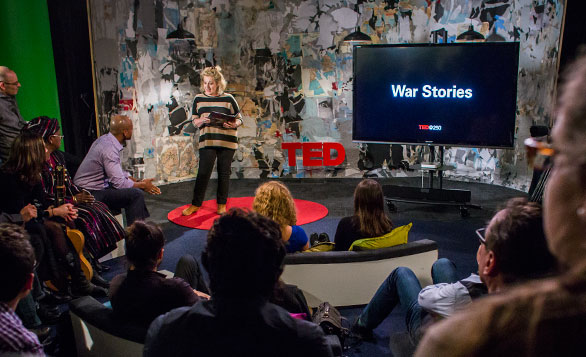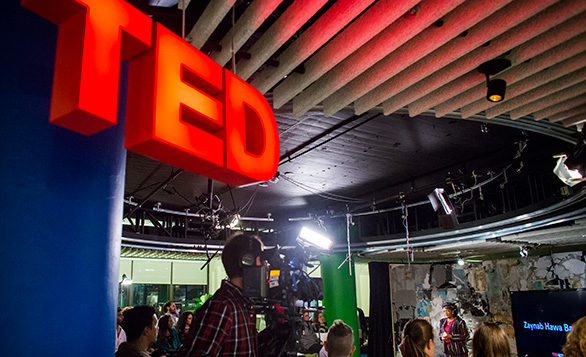
Juliet Blake hosts the TED@250 session “War Stories,” featuring talks from Wes Moore, Sebastian Junger, and two other distinguished speakers. Photo: Ryan Lash
War isn’t easy to talk about. TED’s Juliet Blake knows this first-hand — she is the daughter of German Jews who never spoke about the war that wiped out so many members of their family. And yet, that devastation is exactly why it is so important to have conversations about the worst of human experiences. Over the years, Blake — executive producer of PBS’s TED Talks Education (TED’s first TV special) and producer of the upcoming film The Hundred-Foot Journey (alongside Steven Spielberg and Oprah Winfrey) — has come to recognize the importance of journalists, documentarians and peacekeepers who bring stories from war-torn localities out to the world. This is why she chose to host a session in the TED office last night, dedicated to “War Stories.”
The evening began with Wes Moore, author of the best-selling book The Other Wes Moore. Moore is also a veteran — he was a paratrooper and Captain in the US Army. “I didn’t join the army because I wanted to go to war,” said Moore, who was introduced to the idea of serving when he attended military school as a teenager. “I joined the army because … it was what I knew and what I thought I could do well.” Moore did a tour of duty in Afghanistan and, upon returning, found it highly difficult to adjust to the small facts of life: big crowds, even the brightness of lights around him. (In Afghanistan, soldiers practice “light discipline.”) And he also found himself disconcerted by the only two phrases people said to him about the war: “thank you for your service,” and “did you shoot anybody?” In this beautiful, emotional talk, Moore begs us all to ask soldiers bigger questions — “What was it like? Tell me your story” — because their experiences deserve to be heard.
The next speaker of the night: Zainab Hawa Bangura, a politician from Sierra Leone and the United Nations special representative of the Secretary-General on sexual violence in conflict. “What you see of war in photos and television focus on the destruction of buildings, of property,” says Bangura. “It doesn’t capture the pain. It doesn’t tell you what you feel.” In a heartbreaking talk, Bangura turns our attention to one thing that has been a fact of war across cultures and time: rape. “It is the most dehumanizing, most destructive, most damaging crime anyone can do,” she says. It affects women, girls, men and boys and drives wedges through families — wives are routinely abandoned, children are stigmatized. Her office’s mission is to end the practice of rape in war.
It was a hard, important talk. To lighten the mood, singer-songwriter Margaret Glaspy stepped to the stage next, with a guitar in hand, to play two songs.
And then came a talk from Reza Deghati, a National Geographic photojournalist who has spent decades traversing the globe and capturing moments of war. Growing up in Azerbijian, Deghati remembers thinking: I don’t understand why those people don’t have shoes. The visuals of war and poverty popped out for him, then and now. “What’s important for me in a war zone is not the morgue, the hospital, the mass grave — it’s the reality in the eyes of the survivors,” he says. “I do believe that people touched by these photos will someday change the world … I believe in 1,000 years, our descendants will look and say, ‘See how primitive they were in the 21st century? They were putting their budgets to building weapons to kill each other.’” Deghati also shares a new initiative of his: teaching children in refugee camps to photograph their experience.
Sebastian Junger, author of The Perfect Storm and a longtime war reporter, ends the night with an uncomfortable question: why do soldiers who return home find themselves missing the war? Junger spent time in Afghanistan’s Korengal Valley — an experience which forms the backbone of his Academy Award-nominated documentary Restrepo — which saw a high percentage of the fighting in all of Afghanistan. “The combat experience is a very bizarre one,” says Junger. “You’re usually not scared– though you are before and after. Time slows down, you get tunnel vision. Your attention focuses on some details and others drop out—it’s like an altered state of mind.” The experience of combat leads to a flood of adrenaline and endorphins. And further, it gives soldiers an intense experience of connection and comraderie. Ironically, says Junger, they miss “the opposite of war.”
“War Stories” was part of TED@250, a series of salons held at our New York headquarters at 250 Hudson Street. Since our main conferences are only twice a year, TED@250 is an opportunity for talks that rethink headlines and respond to conversation happening in real time. It’s also a place for speakers with the kind of personal stories that simply work better on the small scale. Stay tuned. Some of these talks may be coming to TED.com.

Behind the scenes in the TED office. Photo: Ryan Lash
Comments (5)
Pingback: Consider *This* The Next Time You Say ‘Thank You For Your Service’ To A Soldier | The Global Point
Pingback: Consider *This* The Next Time You Say 'Thank You For Your Service' To A Soldier | Top ReShare
Pingback: Ever Stressed About What To Say To Veterans? One Vet Explains Exactly What He'd Like To Hear. » The Viral Trend... Funny, Viral Videos, Pictures and Stories